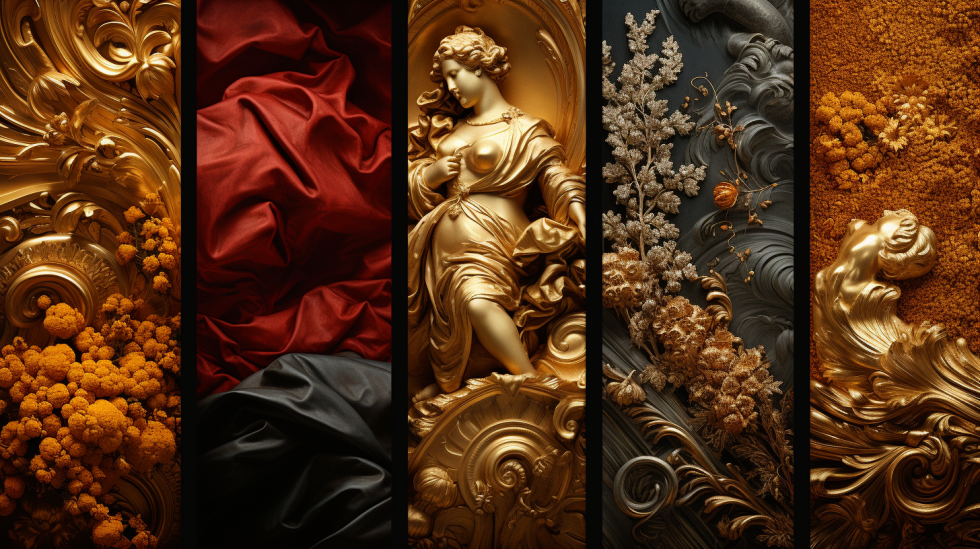Gold, with its radiant hue and enduring luster, has transcended its physical properties to become a symbol of profound significance throughout human history. This precious metal has been associated with gods, wealth, power, and cultural symbolism across civilizations and eras. In this exploration of gold’s symbolism, we’ll journey through the ages to uncover the intricate tapestry of meanings woven around this mesmerizing metal.

The Mythical and Divine Connection
Gold’s association with divinity and the gods dates back to ancient civilizations. In many cultures, gold was seen as a divine metal, representing purity, immortality, and spiritual enlightenment.
Gold in Ancient Egypt
Ancient Egypt, a civilization steeped in mysticism and spirituality, revered gold as the “flesh of the gods.” Pharaohs were often buried with elaborate golden funerary masks, such as the renowned mask of Tutankhamun. These masks served as protective amulets, ensuring a safe journey to the afterlife. The symbolism of gold in these rituals extended to the belief that the pharaohs themselves became divine beings.
Gold in Greek Mythology
In Greek mythology, the gods and goddesses residing on Mount Olympus adorned themselves with golden jewelry and garments. Gold was considered divine and reserved for the immortals. The famous “Golden Fleece” sought by Jason and the Argonauts represented the ultimate prize, embodying the power of gods and kings.
Gold in Hinduism and Buddhism
Eastern religions also attribute spiritual significance to gold. In Hinduism, gold is associated with purity, divinity, and Lakshmi, the goddess of wealth and prosperity. In Buddhism, the Golden Buddha, a statue covered in gold leaf, represents enlightenment and spiritual awakening. The use of gold in religious ceremonies underscores its symbolism as a conduit between the earthly and divine realms.
Gold as a Symbol of Wealth and Power
Gold’s allure as a symbol of wealth and power has been consistent across cultures and eras. Its rarity and intrinsic value have made it the ultimate store of wealth and a means of displaying opulence.
Gold in Ancient Rome
The Romans, known for their opulent lifestyles, used gold to display their affluence. Emperors and aristocrats wore intricate gold jewelry, and gold coins, such as the aureus, symbolized the power of the Roman Empire. The famous Roman general Julius Caesar proclaimed, “Veni, vidi, vici” (“I came, I saw, I conquered”) while referring to his victories in conquering regions with abundant gold resources.
Gold in the Age of Exploration
During the Age of Exploration, European powers embarked on voyages of discovery to find new sources of wealth, particularly gold. The Spanish conquistadors, led by figures like Hernán Cortés and Francisco Pizarro, sought gold in the Americas and amassed vast fortunes. The legendary city of El Dorado, believed to be paved in gold, became the embodiment of untold riches.
Gold Rushes and the American Dream
In the 19th century, the California Gold Rush symbolized the American Dream—an opportunity for individuals to strike it rich through hard work and determination. Tens of thousands flocked to California in pursuit of gold, seeking to change their fortunes. The “49ers” who participated in the gold rush sought not only wealth but also a chance to shape their destiny.
Gold in Art and Culture
The cultural symbolism of gold extends beyond wealth and divinity; it encompasses art, literature, and human aspirations.
Gold in Art
Artists throughout history have used gold leaf and gold paint to create masterpieces. In religious art, the use of gold symbolized the divine and the ethereal. Iconic works like “The Birth of Venus” by Sandro Botticelli and “The Persistence of Memory” by Salvador Dalí use gold to evoke a sense of transcendence and surrealism.
Gold in Literature
Gold appears prominently in literature as a symbol of aspiration, transformation, and greed. In novels like F. Scott Fitzgerald’s “The Great Gatsby,” the pursuit of wealth and the American Dream is embodied by the glimmering gold parties and opulent lifestyles of the characters. Gold also features in ancient legends, such as the quest for the Golden Fleece in Greek mythology.
Gold as a Global Currency
Gold’s symbolism as a universal store of value is evident in its historical use as a global currency. The gold standard, which pegged the value of currency to a specific quantity of gold, had a profound impact on the world economy.
The Gold Standard
The gold standard was a monetary system that prevailed for much of the 19th and early 20th centuries. Countries maintained gold reserves to back their currency. This system provided stability and reassurance to international trade, as currencies were directly convertible to gold.
The End of the Gold Standard
The Great Depression and the two World Wars strained the gold standard, and countries abandoned it to finance their wartime efforts. In 1971, President Richard Nixon officially ended the convertibility of the US dollar to gold, marking the demise of the gold standard. The shift to fiat currencies was a pivotal moment in the history of money, but it did not diminish gold’s symbolic significance.
Gold in Modern Symbolism
Even in the modern era, gold continues to be a symbol of prosperity, achievement, and excellence.
Olympic Gold
The gold medal awarded at the Olympic Games represents the highest achievement in sports. Athletes strive for gold not only for its material value but also for the recognition it symbolizes—the pinnacle of athletic excellence.
Gold in Corporate Branding
In the corporate world, gold is often used in branding to convey luxury and quality. Products adorned with gold packaging or logos evoke a sense of prestige and excellence. The use of gold in corporate branding underscores its enduring symbolic value.
Conclusion: Gold’s Timeless Symbolism
In conclusion, gold’s symbolism is a tapestry woven through the fabric of human history, culture, and aspiration. From ancient civilizations to modern societies, gold has represented divinity, wealth, power, and excellence. Its symbolic value extends beyond its rarity and material worth, reaching into the realms of art, literature, and global finance.
Gold’s shimmering presence in our collective imagination endures, reminding us that it is not just a metal but a symbol of human ingenuity, ambition, and the eternal quest for meaning and significance.
As we continue our exploration of gold in this book, we will delve further into its cultural significance, its role in modern economies, and its enduring allure as a precious metal of intrinsic value and timeless symbolism.



